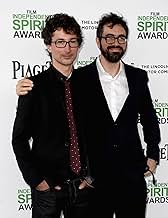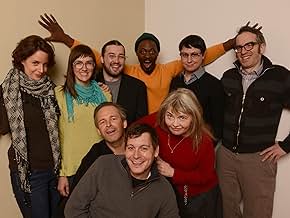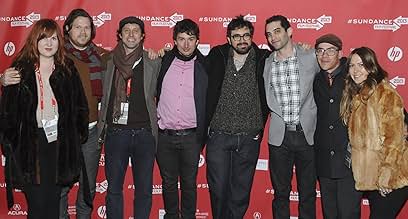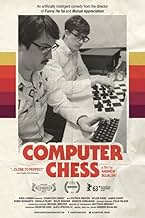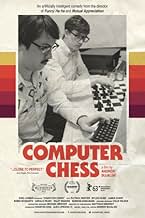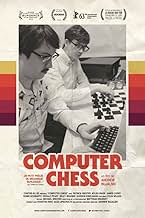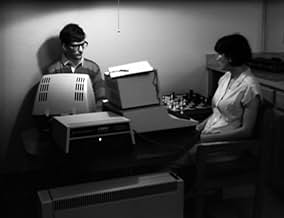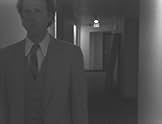AVALIAÇÃO DA IMDb
6,2/10
4,9 mil
SUA AVALIAÇÃO
Adicionar um enredo no seu idiomaA 1980s-set story centered around a man vs. machine chess tournament.A 1980s-set story centered around a man vs. machine chess tournament.A 1980s-set story centered around a man vs. machine chess tournament.
- Prêmios
- 2 vitórias e 8 indicações no total
Daniel Metz
- Reini Urban
- (as Daniel C. Metz)
Avaliações em destaque
I can sit through the most ponderous Joe Swanberg film, the most ridiculous thing ever directed by the Duplass brothers Jay and Mark, respectively, and can even tolerate monotony bestowed upon a talky independent movie in terms of my affection and devotion to the mumblecore movement in cinema. However, when watching a film by the proclaimed "godfather" of the movement Andrew Bujalski, I find myself in a figurative wrestling match between myself and his films. His films are well shot, wonderfully lit and captured given the minimal budgets, and are believably conducted from an acting standpoint, but when the characters open their mouths, not much interesting comes out and when the plot "gets going," not much noteworthy seems to happen. Arriving at the conclusion of his directorial debut Funny Ha Ha, his follow-up effort Mutual Appreciation, and now, his latest endeavor, Computer Chess (arguably his best reviewed film), I am met with nothing other than emptiness, isolation, and very little to write about.
When I enjoy a film that falls in line with the mumblecore movement, bearing a micro-budget, naturalistic dialog, simple but thoughtful acting, themes classified under the title of social realism, and a basic plot that offers much discussion, I'll talk about it for days and write a long, healthy review of the film. When I don't enjoy a film of the mumblecore movement, I'll struggle for sometimes over an hour trying to summarize why I didn't enjoy it. Films like these rely so heavily on character and realism that not liking the film likely means that you didn't like the characters for some reasons.Your tolerance for simplicity, tone, and character needs to be relatively high or the film is likely to escape you. Computer Chess escaped me early on and neither I nor it every reconnected.
The story concerns a computer chess tournament circa 1980's, when the home-computer/computer revolution was jut gaining momentum. People were in awe at the fact that a person can play a machine in a game like chess and have a chance at losing. The power of a machine shaped like a large box was greatly underestimated and tournaments for computer chess and other basic video games became relatively common. The picture is aesthetically complete, showing the players as probably how they were. Many of them wore button-down shirts, vests over their shirt, pocket-protectors, thick-rimmed glasses, had neatly combed hair and a fine-trimmed mustache, along with the benefits of khaki pants and their brain power.
Long story short, they were geeky, but they also were the reason why computers advanced so much in such a relatively short period of time. One look into the history books - or this film, in particular - and you see their equipment was clunky, slow, and unreliable. If they wanted better materials, they couldn't utilize the internet to their advantage. All they could do was do what they could with what they had, and they became the technical pioneers of a larger-than-life industry that many of us take for granted today.
Writer/director Bujalski does a nice job on the environment and the atmosphere of the picture, making the entire project have the look and possibly the aroma of a 1980's chess tournament. The computer and software equipment they had defines the very principles of primitive technology, and Bujalski shows this by incorporating memorable computer sounds of the time, along with the believable execution of an early computerized chess tournament. The black and white photography the film bears only emphasizes this quality. It also helps a film with weak or uninteresting material to make up for it in the aesthetic department, but unfortunately, Computer Chess can't entirely rebound.
Reviews of Computer Chess have marveled at the existential value of the picture. Most everyone has hailed the set design and the aesthetic work (my sole attraction before and after watching the film). And some claim that there's a great meditative style to the picture that offers a valuable viewing. I was free of almost everything in that vicinity watching the film. Bujalski's commitment to recreating an odd, specific time-frame in history deserves significant recognition, but the story he concocts around alienating characters leaves a lot to be desired. When admiration for the history subsides and fascination with aesthetics simmers, what you have is another film with a tiresome story. Like peeling away at the unique looks of a human being to find we're the same on the inside; that's never any fun.
Starring: Kriss Schludermann, Tom Fletcher, and Wiley Wiggins. Directed by: Andrew Bujalski.
When I enjoy a film that falls in line with the mumblecore movement, bearing a micro-budget, naturalistic dialog, simple but thoughtful acting, themes classified under the title of social realism, and a basic plot that offers much discussion, I'll talk about it for days and write a long, healthy review of the film. When I don't enjoy a film of the mumblecore movement, I'll struggle for sometimes over an hour trying to summarize why I didn't enjoy it. Films like these rely so heavily on character and realism that not liking the film likely means that you didn't like the characters for some reasons.Your tolerance for simplicity, tone, and character needs to be relatively high or the film is likely to escape you. Computer Chess escaped me early on and neither I nor it every reconnected.
The story concerns a computer chess tournament circa 1980's, when the home-computer/computer revolution was jut gaining momentum. People were in awe at the fact that a person can play a machine in a game like chess and have a chance at losing. The power of a machine shaped like a large box was greatly underestimated and tournaments for computer chess and other basic video games became relatively common. The picture is aesthetically complete, showing the players as probably how they were. Many of them wore button-down shirts, vests over their shirt, pocket-protectors, thick-rimmed glasses, had neatly combed hair and a fine-trimmed mustache, along with the benefits of khaki pants and their brain power.
Long story short, they were geeky, but they also were the reason why computers advanced so much in such a relatively short period of time. One look into the history books - or this film, in particular - and you see their equipment was clunky, slow, and unreliable. If they wanted better materials, they couldn't utilize the internet to their advantage. All they could do was do what they could with what they had, and they became the technical pioneers of a larger-than-life industry that many of us take for granted today.
Writer/director Bujalski does a nice job on the environment and the atmosphere of the picture, making the entire project have the look and possibly the aroma of a 1980's chess tournament. The computer and software equipment they had defines the very principles of primitive technology, and Bujalski shows this by incorporating memorable computer sounds of the time, along with the believable execution of an early computerized chess tournament. The black and white photography the film bears only emphasizes this quality. It also helps a film with weak or uninteresting material to make up for it in the aesthetic department, but unfortunately, Computer Chess can't entirely rebound.
Reviews of Computer Chess have marveled at the existential value of the picture. Most everyone has hailed the set design and the aesthetic work (my sole attraction before and after watching the film). And some claim that there's a great meditative style to the picture that offers a valuable viewing. I was free of almost everything in that vicinity watching the film. Bujalski's commitment to recreating an odd, specific time-frame in history deserves significant recognition, but the story he concocts around alienating characters leaves a lot to be desired. When admiration for the history subsides and fascination with aesthetics simmers, what you have is another film with a tiresome story. Like peeling away at the unique looks of a human being to find we're the same on the inside; that's never any fun.
Starring: Kriss Schludermann, Tom Fletcher, and Wiley Wiggins. Directed by: Andrew Bujalski.
I had absolutely no clue what I was letting myself into. Just that a friend of mine was telling me I had to see it. It played at the International Film Festival in Berlin and I can only say my friend was right. If there is just a slight geeky/nerdy side in you, you will like this movie too. The fact, they had me guessing for a second, if that was actually made back when this is supposed to play is just great.
Of course, even if you don't know if this is a real documentary or not (it's not), you will get this very early on. But the jokes are really funny and even when it seems to be dragging a bit, it will pick up speed again and deliver on its funny premise. The acting is great and the film does look as old as it is supposed to look. Jokes work nicely and the overall feeling is just great. Check-mate
Of course, even if you don't know if this is a real documentary or not (it's not), you will get this very early on. But the jokes are really funny and even when it seems to be dragging a bit, it will pick up speed again and deliver on its funny premise. The acting is great and the film does look as old as it is supposed to look. Jokes work nicely and the overall feeling is just great. Check-mate
Computer Chess may have an unconventional and experimental style, but its story is simple. It's very much like a Christopher Guest competition mockumentary setup with a similar satirical sense of humour and fortunately its exposition is welcome and well-handled. Its video and black and white cinematography feels more than a gimmick and places the film convincingly in the 80s. At least it makes better use of it than last year's disappointing No. Although it's intended as a character-based film, peering into the lives of the contestants rather than concerned with the competition itself, it's the area it struggles with most. It's difficult to keep track of characters and many feels like cartoons. But its themes still work. It makes you think about the progression of technology and its integration with society as well as what you should live for. It's more of a directors movie with hints of surrealism and meta scenes where the gimmick breaks the mold which results in making Computer Chess interesting, thoughtful and entertaining film but wildly inconsistent with the places where it doesn't know what it's doing.
7/10
7/10
This is a masterpiece of simplicity and intelligence. Beautifully shot with a PortaPak camera in early 80's style, or at least it looks like one. Story of passionate people in search for love. Computer Chess! What a wonderful idea to gather a plot. Specially when you have a drop of new age religion involved and strong sexual energy restrained. Sincerely humorous, this film hits the point. Specially in today's technology-obsessed universe. Acting is so convincing and natural that one can easily think of it as a documentary, but its not - its art. Reminds on early Cassavetes. I will definitely wait for Bujalski's next film. Personally, best at Berlinale 2013. Love this film.
If you are out of sleeping pills or have insomnia.
Guaranteed to put you to sleep. I actually had a fabulous nap - 2 or 3 of them actually - while attempting to keep my eyes open. There might have been a premise somewhere in there but only the director and his friends could tell you about it since everyone else will be fast asleep - or doing the neck dance of nodding in and out of sleep.
Computers, chess, retro, dry dialogue, vintage cameras.... on paper this could have been fun and quirky and a nice time.
Anyway, next time you feel too wired to sleep and don't have any substances to help you, put this on and you'll conk out in minutes (that or throw your TV against the wall).
Guaranteed to put you to sleep. I actually had a fabulous nap - 2 or 3 of them actually - while attempting to keep my eyes open. There might have been a premise somewhere in there but only the director and his friends could tell you about it since everyone else will be fast asleep - or doing the neck dance of nodding in and out of sleep.
Computers, chess, retro, dry dialogue, vintage cameras.... on paper this could have been fun and quirky and a nice time.
Anyway, next time you feel too wired to sleep and don't have any substances to help you, put this on and you'll conk out in minutes (that or throw your TV against the wall).
Você sabia?
- Citações
Pauline: Peter, did you ever stop and ask yourself how many squares are on a chess board?
Bishton: 64. It's an 8 by 8 grid.
Pauline: Well... but don't you see how limited that is?
Bishton: No, it's actually very complex once you start to think about it as a programming problem. Just the number of possible games explodes exponentially with each move, it's close to 10 to the 120th power. And to try and compute all those games might take even longer than humanity would be around to do so.
- Cenas durante ou pós-créditos"Mysterious Woman ... herself"
- ConexõesFeatured in The 2014 Film Independent Spirit Awards (2014)
- Trilhas sonorasNothin' But Changin'
By Collie Ryan
Principais escolhas
Faça login para avaliar e ver a lista de recomendações personalizadas
- How long is Computer Chess?Fornecido pela Alexa
Detalhes
- Data de lançamento
- País de origem
- Centrais de atendimento oficiais
- Idioma
- Também conhecido como
- Комп'ютерні шахи
- Locações de filme
- Empresa de produção
- Consulte mais créditos da empresa na IMDbPro
Bilheteria
- Faturamento bruto nos EUA e Canadá
- US$ 102.041
- Fim de semana de estreia nos EUA e Canadá
- US$ 9.683
- 21 de jul. de 2013
- Faturamento bruto mundial
- US$ 127.852
- Tempo de duração
- 1 h 32 min(92 min)
- Cor
- Proporção
- 1.33 : 1
Contribua para esta página
Sugerir uma alteração ou adicionar conteúdo ausente


